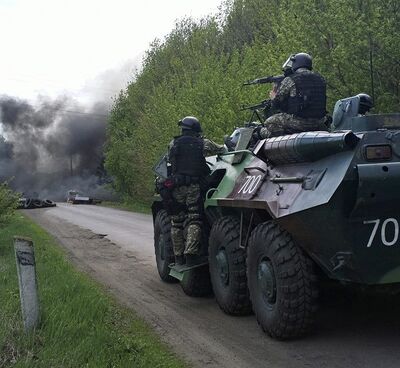Imerti Conflict
| Imerti Conflict | |||||||
|---|---|---|---|---|---|---|---|
 Syaran reinforcements arrive in Imerti | |||||||
| |||||||
| Belligerents | |||||||
|
|
| ||||||
| Commanders and leaders | |||||||
|
|
| ||||||
| Strength | |||||||
|
|
| ||||||
| Casualties and losses | |||||||
|
247 killed 913 wounded 112 captured |
89 killed 455 wounded 288 captured | ||||||
The Imterti Conflict was a five day long war fought between Ruvelka and Syara in August 2005. The war began after a series of border clashes that resulted in Ruvelkan troops crossing into Imerti and seizing control of several key villages and towns, which was followed by a counterattack by local Syaran forces. The fighting began on 9 August and ended on 14 August following a ceasefire negotiated by the Organization of Tyrannic Nations.
Imerti was one of several border regions claimed by both Syara and Ruvelka; although inhabited primarily ethnic Ruvelkans, it had been under Syaran control since the Siduri War. Tensions between the two countries began rising in the early 2000s following the election of the pro-Warden Executive Dragomir Zhelev, and several skirmishes broke out along the border as patrols on both sides began enforcing the border claims more overtly. In the summer of 2005 Imerti was the site of several engagements, including firefights between border guards and both sides shelling outposts on the other side of the border. After several weeks of back and forth clashes, Ruvelkan forces launched an offensive operation into Imerti on 9 August, believing that Syaran forces were preparing to assault and occupy Ruvelkan border checkpoints. The Ruvelkans met with initial success at first, seizing control of over 15 towns and villages through Imerti, but on 12 August Syaran reinforcements launched a series of counterattacks that forced the Ruvelkans back across the border while inflicting heavy losses. An OTN leveraged ceasefire brought an end to the fighting, and the brief conflict was officially ended on 14 August.
The Imerti Conflict is widely seen as a forerunner to the much more destructive and longer Zemplen War that would occur three years later. Many of the lessons learned in the Imerti Conflict directly influenced both the Syaran Commonality Armed Forces and the Imperial Armed Forces of Ruvelka. Æsthurlav analyst Iorek Jokinen argued that the Imerti Conflict demonstrated the tactical superiority of the SCAF over the Ruvelkan military, noting that while Ruvelka was able to react quickly and seize the initiative over Syara, heavily mechanized Syaran reinforcements proved too powerful for Ruvelka's light infantry task forces to handle, resulting in lopsided casualties in favor of Syara. Major Neasa Ní Baoill of the Ossorian Armed Forces noted that the "foundations of the outcome of the Zemplen War were laid down in Imerti", arguing that Syara's success "convinced Syaran leadership of their military supremacy over Ruvelka, thus making them more willing to fight over Zemplen three years later" while noting that the conflict also served as "a rude awakening to the Ruvelkan Imperial General Staff, who would rapidly, and mostly successfully, re-evaluate and redefine how they would fight a modern war".